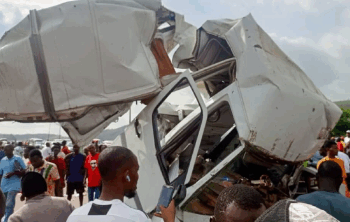The Nigerian House of Representatives has called on the Federal Government to make cancer screening free of charge, a move aimed at addressing the escalating cancer burden and alleviating the financial strain on patients.
The resolution, adopted on Wednesday, May 7, 2025, followed a motion by Honourable Adeyemi Oseni titled “Need to Subsidise the High Cost of Cancer Treatment in Nigeria.”
The motion highlights the alarming spread of cancer, with approximately 125,000 new diagnoses in 2020, and underscores the urgent need for accessible screening and subsidized treatment to save lives in a country where healthcare costs often push families into poverty.
The Motion: A Response to a Growing Crisis
Honourable Adeyemi Oseni, representing Ibarapa East/Ido Federal Constituency in Oyo State, presented the motion during a plenary session, drawing attention to cancer’s devastating impact on Nigerians.
Citing 2020 data from the World Health Organization (WHO), Oseni noted that Nigeria recorded 124,815 new cancer cases and 78,899 deaths, with breast, cervical, prostate, and liver cancers being the most prevalent.
He emphasized that the high cost of diagnosis and treatment—often exceeding ₦500,000 ($300) for initial screening and millions for chemotherapy or surgery—remains unaffordable for most Nigerians, 70% of whom live below the poverty line of $1.90 daily.
Oseni argued that free cancer screening would enable early detection, significantly improving survival rates, as seen in countries like Rwanda, which offers free cervical cancer screening.
“Cancer is a silent killer, and its spread is alarming. Many Nigerians cannot afford even the basic tests to detect it early, let alone treatment,” he stated, urging subsidies for screening, diagnostics, and cancer drugs.
The motion received unanimous support, reflecting bipartisan recognition of the crisis, with Speaker Tajudeen Abbas directing the Committee on Healthcare Services to act swiftly.
Mandate for Action: Subsidies and Collaboration
The House mandated its Committee on Healthcare Services to collaborate with the Federal Ministry of Health and Social Welfare, the National Health Insurance Authority (NHIA), and other relevant agencies to establish mechanisms for free cancer screening and subsidized treatment.
The committee is tasked with developing a framework to integrate screening into primary healthcare centers, reduce costs of oncology drugs, and expand coverage under the NHIA’s Vulnerable Group Fund, which currently supports 1.5 million indigent patients but excludes most cancer care.
The resolution aligns with Nigeria’s National Cancer Control Plan (2018–2022), which aims to reduce cancer mortality by 25% through early detection and treatment access.
However, implementation has lagged, with only 12% of the plan’s $1.2 billion budget funded by 2024, per the National Institute for Cancer Research and Treatment (NICRAT).
The House’s push for free screening could revitalize these efforts, leveraging existing infrastructure like the 22 cancer treatment centers nationwide, including facilities at Lagos University Teaching Hospital (LUTH) and Ahmadu Bello University Teaching Hospital (ABUTH).
The Cancer Burden in Nigeria
Nigeria’s cancer crisis is stark. WHO data projects 139,000 new cases in 2025, driven by rising risk factors like aging populations, tobacco use, poor diet, and limited screening. Breast cancer, with 28,380 cases in 2020, and cervical cancer, with 12,075 cases, disproportionately affect women, while prostate cancer (13,078 cases) is a leading killer among men.
Only 10% of cases are detected early due to low awareness and screening rates—less than 5% of women undergo regular mammography or Pap smears, compared to 70% in high-income countries.
Treatment costs exacerbate the crisis. A single chemotherapy cycle can cost ₦200,000 ($120), while radiotherapy at private centers like NSIA-LUTH Cancer Centre averages ₦1.5 million ($900).
Public hospitals, underfunded and equipped with only 12 functional radiotherapy machines for 220 million people, face long waitlists, forcing patients to seek unaffordable private care or forgo treatment.
The NHIA covers just 2% of cancer patients, leaving families to sell assets or crowdfund, as seen in viral X campaigns like @HelpCancerNG.
Public Sentiment and Challenges
The motion has sparked widespread support on X, with @LeadershipNGA praising it as a “lifesaver for millions,” and @VoiceofNigeria noting its potential to “ease the burden on families.” Users like @HealthEquityNG urged swift implementation, citing cases of patients dying due to delayed diagnosis.
However, skeptics like @NaijaObserver questioned funding feasibility, given Nigeria’s 2025 health budget of ₦1.98 trillion ($1.2 billion), only 6% of total expenditure and below the African Union’s 15% target. Past initiatives, like the 2021 Cancer Health Fund, have been hampered by bureaucracy, covering just 1,200 of 10,000 applicants.
Key challenges include inadequate infrastructure—Nigeria has only 80 oncologists for 139,000 annual cases, per NICRAT—and low public awareness, with 60% of patients presenting at advanced stages.
Rural areas, where 48% of Nigerians live, lack screening facilities, necessitating mobile clinics, as piloted in Ogun State in 2023.
Corruption in health procurement, as exposed in a 2024 Senate probe into oncology equipment fraud, further complicates subsidy rollout.
What you should know
The House’s resolution marks a pivotal step toward addressing Nigeria’s cancer crisis, but its success hinges on robust funding, political will, and public-private partnerships.
The Committee on Healthcare Services, chaired by Honourable Amos Magaji, is expected to deliver a framework by Q3 2025, potentially integrating free screening into the NHIA’s Basic Healthcare Provision Fund, which serves 12,000 primary health centers.
Models like India’s National Cancer Grid, offering subsidized diagnostics, could guide Nigeria’s approach.
For millions of Nigerians, free screening could mean the difference between life and death, aligning with Tinubu’s “Renewed Hope” agenda to improve healthcare access.
As the committee collaborates with stakeholders, the focus will be on scaling infrastructure, training healthcare workers, and raising awareness to ensure no Nigerian is priced out of survival.
The House’s call, if realized, could set a precedent for Africa, where cancer claims 700,000 lives annually.
ALSO READ TOP STORIES FROM VERILY NEWS

















